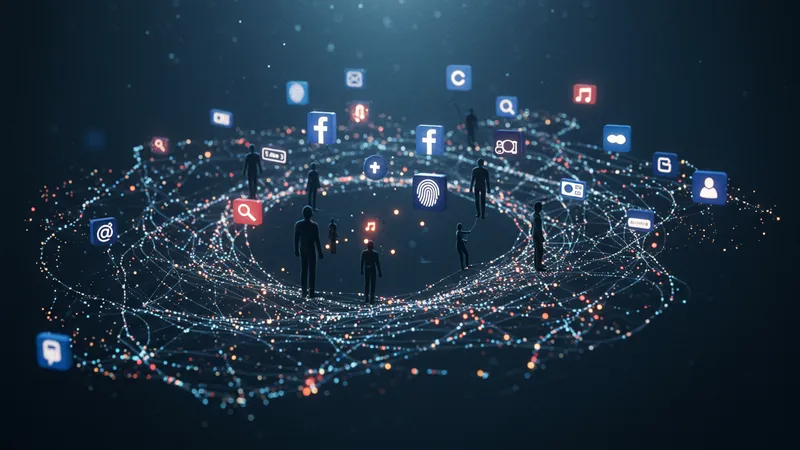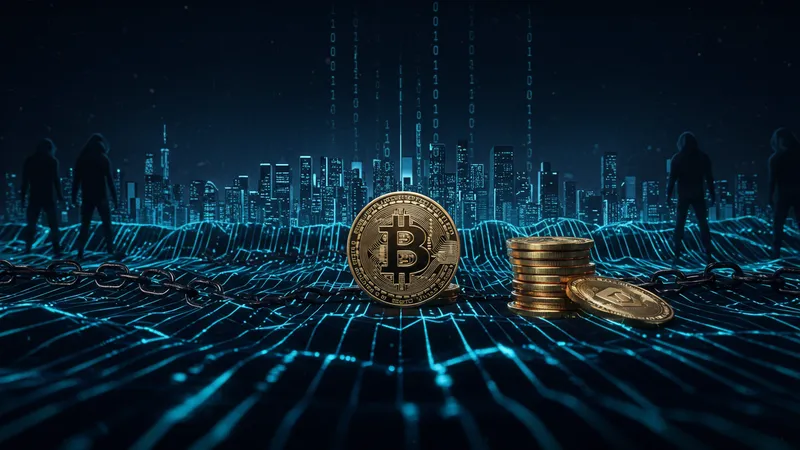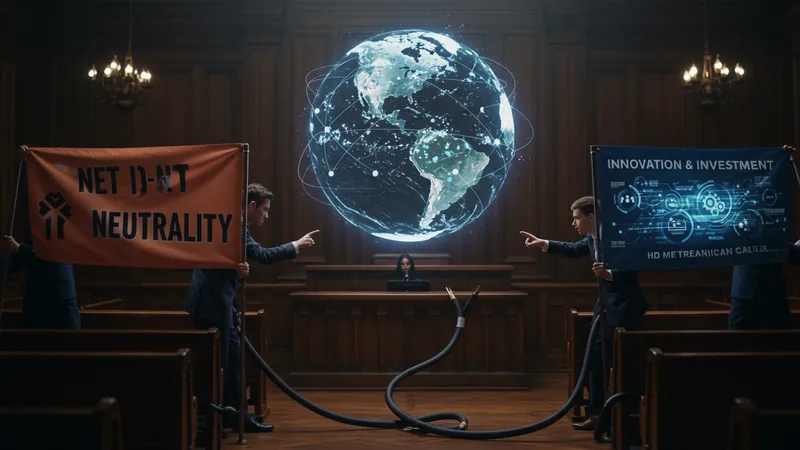

Are you aware that in today's hyper-connected world, your liberties are being subtly stripped away—one click at a time? Every app downloaded, every service signed up for twists the knife deeper.
Securing your freedoms is more crucial than ever before as technology evolves faster than regulation can keep up. Citizen rights hang in the balance with every data breach and privacy scandal.

Consider this: while technology promises convenience, it's also paving an open road for those who wish to curb your rights. Edward Snowden's revelations shook the core of global communications, exposing how easy it is for governments to access and control personal data. But that’s not even the wildest part…
Large tech companies are raking in billions under the pretense of connecting the world. Yet, behind the scenes, they're developing systems that monitor your every move—that ad you saw on Facebook wasn’t a coincidence. But here’s the kicker: they’re pushing deep into AI technologies that could redefine surveillance as we know it. But this is only scratching the surface…
As privacy law lags behind technological advances, the risk to individual liberties grows starker. What happens next shocked even the experts…
What price do we pay for the on-demand lifestyles we cherish? Behind every convenient tap on a screen lies an intricate web of algorithms that study you more intently than even the most avid fan. These algorithms are not just harmless sequences of code; they are meticulously crafted to predict—and often manipulate—your behavior.

Social media apps employ neuroscientists to perfect dopamine triggers, turning common interactions into addictive experiences. Ever wonder why you can't put your phone down once you start scrolling? It's designed that way. Your engagement is worth more than gold to advertisers, and you’re the product that keeps on giving. But there's one more twist...
A dark side of these innovations is data overreach. Terms and conditions, often ignored at sign-up, conceal the extent to which data is harvested and shared. Have you really looked at what you’re agreeing to when you tap 'I accept'? It’s akin to signing away freedoms without a second thought. And this is just the beginning…
The lack of transparency around data usage leaves room for misuse beyond our imagination. Yet, as users, we've been lulled into complacency because of the sheer volume and complexity of information. What you read next might change how you see this forever.
The magnitude of surveillance capitalism's reach is often underestimated. It's not just about monitoring; it's about influencing. Shoshana Zuboff termed it "a new form of dominance," and she's not wrong. The data collected from millions is used to predict, manipulate, and dictate choices—from which ads you see to which routes you take on your morning jog.

Research has shown targeted advertisements can sway public opinion, affecting everything from elections to consumer habits. Thinking that your choices and preferences are purely your own? Think again—many are pre-determined by algorithms that know you better than your closest friends. But hold on, there’s more to unravel...
Even as we enjoy algorithm-driven conveniences, the unaccounted risks loom large. Privacy breaches are disturbingly common, yet businesses continue to insist on expansive data collection. The insidious reality is that once your data is out there, there’s no taking it back. The implications extend into the core of democracy itself.
Governments and corporations now have unprecedented power through data. Used wisely, it could benefit society tremendously, but with misuse, it holds the potential for significant harm. What’s next could very well redefine freedom as we know it.
Data breaches have become a regular feature in the news, yet society’s reaction remains muted. Why? Perhaps due to their frequency and the overwhelming nature of the details. Breaches reveal a trail of negligence and misplaced priorities, with more concern over PR fallout than personal data security.

Consider notable breaches, such as those at Equifax or Yahoo. Millions of users’ data, including financial details, were pillaged. It starkly highlighted how even trusted names struggle with basic security. Yet the real shock lies in what happens with your data after such an incident. But stay tuned for the deeper implications...
The aftermath of a breach often leads to fines and settlements, but rarely do they impact the root causes or prevent recurrence. This exposes a system prioritizing recovery over prevention. We must interrogate: who really pays the price? More often than not, it's the consumers themselves.
As each leak unfolds, it paints a grim picture of accountability, or the lack thereof. Victims face long-term consequences while regulations lag, revealing notable inefficiencies in safeguarding information. Profits continue to flourish at the expense of privacy. Exploring the hidden impacts could open new vistas of understanding.
We're all guilty of gravitating towards that shiny 'free' label, be it an app or a service. But here's the catch—nothing is truly free on the internet. The notion of 'free' is often used as bait, pulling users in while they unwittingly agree to compromise their data.

Platforms like Facebook and Google seem cost-free but demand something far more valuable: your personal information. This exchange allows them to monetize you, cleverly turning your likes, searches, and clicks into insights sold to the highest bidder. But the real story is even more compelling...
The facade of free services cleverly distracts from the inherent value your data holds. If you knew what your digital footprint is truly worth, you'd demand a share of profits. It's a ponderous thought, especially since companies tout themselves as purely benefactors.
Understanding the model behind free services unlocks a deeper realization. Once systems capture and analyze your data, it’s used without you reaping the benefits. Every click and scroll is a transaction. But before you close the tab, there's more lurking beneath these seemingly harmless exchanges.
Artificial Intelligence, heralded as the beacon of the future, is not without its caveats. It's a tool with astonishing potential but comes with risks that are only starting to surface. From predictive policing to facial recognition, the AI landscape is as perilous as it is promising.

One overlooked aspect is AI's innate biases, often mirroring those of its creators—humans. This has led to instances where AI unfairly targets minority groups or perpetuates harmful stereotypes. Despite attempts to fix such biases, the problem remains tenaciously embedded. Yet, unraveling the implications of this could keep you wary…
Moreover, as AI becomes a cornerstone of technology, the power it places in certain hands while stripping others of agency is undeniable. Surveillance cameras powered by facial recognition are increasingly common, yet subject to minimal regulation. It's a chilling scenario that merits deep introspection.
AI can undoubtedly enhance efficiency and drive innovation, but its downsides urge diligent oversight. More than ever, the industry requires transparent mechanisms to balance ethical considerations. Navigating these complexities could shape the very fabric of freedom in the years to come.
The dreaded privacy policy—a sea of legal jargon capable of sinking even the most determined reader. The complexity of these documents is no accident but rather a calculated approach to ensure users remain unaware of what they consent to.
Most consumers lack the time or expertise to dissect them, resulting in unintentional agreement to wide-reaching data captures. Investing time into demystifying these texts might save significant future headaches, but are you willing to take the plunge? Because here’s where things get interesting…
Companies exploit this obfuscation, embedding permissions that allow extensive data collection. It's a convenient loophole, keeping users in the dark while businesses thrive. The scale of this hidden economy reveals the stark truth about modern consent.
Advocates argue for simplification and regulation to ensure honest practices. Until then, consider the cost of digital ignorance. Decoding these policies could spark critical change, emphasizing a user-centric approach over corporate dominance. Understanding the nuances might just equip you for a privacy rebound.
Cryptocurrency heralds itself as a revolution, offering financial independence removed from centralized banking systems. But the reality is murkier than the utopian ideal suggests. While it promises freedom, it also raises serious questions about security and regulation.

The market's extreme volatility belies its promise of stability. Investors ride the rollercoaster of value fluctuations, sometimes losing fortunes overnight. Behind the digital gold rush lies an underbelly of dubious practices and unregulated exchanges. But that's not all the crypto world conceals...
There’s also the matter of mining, a process both resource-intensive and environmentally damaging, countering some of the sustainability arguments often put forth. The hidden costs, both ecological and economic, are prompting critical reevaluation.
Perhaps most surprising, cryptocurrencies are becoming a new frontier for illicit activities, assisted by their anonymity. While the allure of decentralized finance grows, so does the pressing need for understanding its nuanced implications on our freedoms. Delving into this ecosystem reveals both innovation's promise and peril.
Net neutrality—the principle ensuring equal treatment of all internet traffic has been fiercely contested. Its broad impact on digital freedoms makes understanding its ebbs and flows pivotal. Once protected, its regulations faced erosion, prompting stark debate.

Proponents argue it prevents internet service providers from controlling your access to content, maintaining a democratized web. Conversely, some insist it stifles investment and innovation. The debate is more layered than it appears, carrying wider implications than initially perceived...
With each legislative push and pull, stakeholders—be it corporations, governments, or consumers—find themselves embroiled in a battle for digital equity. The stakes extend beyond mere content access to the bedrock of digital rights privacy and freedom of speech itself.
An open internet underpins innovation and diversity, yet as policies shift, so too must our understanding of rights and responsibilities. What happens in the aftermath of net neutrality debates? The answer might redefine how we engage with the digital realm moving forward.
Digital censorship has evolved into a sophisticated tool of control. Nations gain leverage by regulating online content, filtering dissent, and shaping discourse. This modern gatekeeping raises critical questions about autonomy and access.

Authorities argue such measures maintain societal order, yet suppressing perspectives remains a contentious move, sparking international critique. The balance between safety and speech proves elusive, with stakes escalating in an interconnected world. What often goes unseen is the intricate machinery driving these operations…
From blocking specific websites to employing strategic misinformation campaigns, the breadth of digital censorship is alarming. Giants like China employ 'Great Firewall' tactics, altering the very fabric of information dissemination. Understanding its ripple effects on freedom is imperative.
The internet was conceived as a bastion of free expression, yet it now stands vulnerable to manipulation. The current landscape signals a global need for reinvigorating digital freedoms. The consequences of unchecked power in curbing speech are only beginning to surface.
Modern conflict is no longer confined to physical spaces; cyberspace has emerged as a potent frontier. Cyber warfare, waged silently, can be as devastating as traditional combat, impacting economies and infrastructure globally.

State actors target sensitive sectors like power grids and financial institutions, wielding digital tools with unprecedented precision and impunity. Nations grapple with strategies to manage these new threats. But the realm of cyber warfare conceals yet deeper layers...
The blurred line between cyber espionage and warfare creates complex tensions. Hacktivist groups and non-state actors operate in the shadows, exploiting vulnerabilities to advance varied agendas. The unpredictable nature of these engagements fuels uncertainty and unease.
To navigate this unseen battlefield, a paradigm shift in cybersecurity strategies is paramount. Understanding offensive and defensive dynamics in cyberspace may be pivotal to future global stability. The paramount question remains: can freedom thrive in a landscape rife with digital conflict?
Virtual reality proposes new realms of possibility—spaces where boundaries blur and creativity blossoms. Yet, this burgeoning technology invites critical examination of its effects on society and individual freedoms.

VR's allure hinges on immersive experiences, but these can potentially blur the lines between reality and simulation. As adoption grows, questions about the psychological impact and ethical considerations arise. What if this virtual freedom entraps us instead? There’s more beneath the surface...
Beyond entertainment, VR's role in sectors like education and healthcare demonstrates its broad potential. However, access remains uneven, with societal implications for those left behind in this digital divide.
The dual nature of VR tells a complex story—one of empowerment and escapism. Navigating this cutting-edge landscape offers insight into dualities of digital liberty and control. Unlocking VR's true potential involves a dialogue on inclusivity and ethics that everyone must engage in.
The gig economy heralds a promise of autonomy and flexibility for workers worldwide. However, as it embeds itself into the societal fabric, it also raises concerns about labor rights and stability.

In theory, gig platforms empower workers to choose when and where they labor. Yet, the lack of protections like healthcare and benefits paints a different picture—a precariousness that blurs the line between independence and vulnerability. But there are deeper layers that warrant exploration...
Examining the gig economy reveals innovations such as ride-sharing apps merely mask a harsher reality. Companies delegate risks onto individual contractors while reaping substantial profits, breeding inequality within a supposedly liberating structure.
Balancing freedom and security in the gig sector is a challenge demanding comprehensive policy reform. Unveiling this tension helps highlight the importance of evolving workplace paradigms to guarantee fair treatment while recognizing diverse working models.
The tactics influencing our freedoms may hide in plain sight, but awareness can empower us to reclaim control. Understanding shifts in digital landscapes, confronting the nature of control, and advocating for transparency is a collective responsibility—a battle for liberties we cannot afford to lose.
Do you find this article insightful? Share it with your network, bookmark it for reference, and start conversations that matter. Your awareness is the first step towards safeguarding your freedoms.